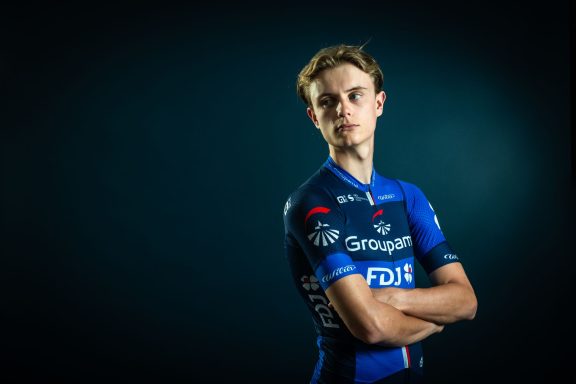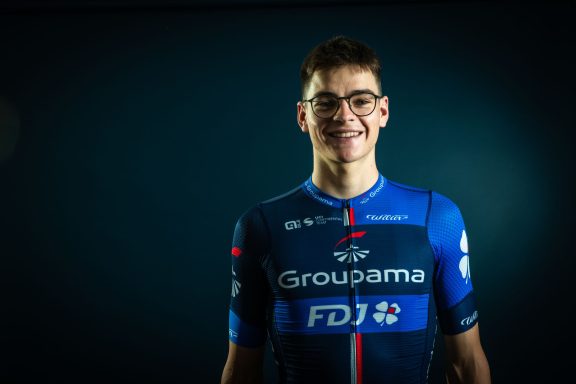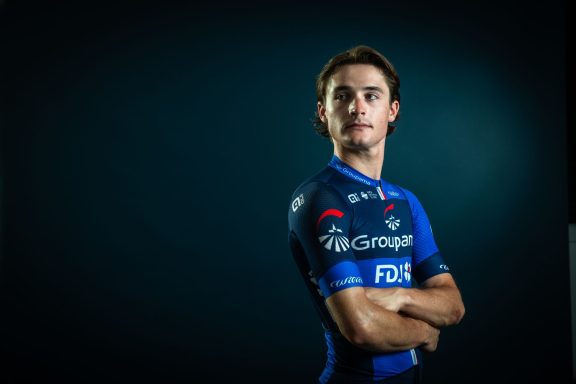At the age of 21, Clément Davy is one of the most experienced riders in the Groupama-FDJ development team. Already a squad member in the launching year, the young man doesn’t have the most typical profile for a Frenchman: he is a “rouleur”. Moreover, these abilities have already enabled him to get some great results under his belt. We sat down with him get to know him better.
A native of the Mayenne department, a Paris-Roubaix lover and a Groupama-FDJ organization member; if that was a riddle, the answer would be obvious. However, we are now talking about Clément Davy, who has all this in common with his boss. On the other hand, it is further north in the department, nearly a hundred kilometers from Renazé (where Marc Madiot is from, editor’s note) that the young man started cycling, at the age of six, in the Bocage Cycliste Mayennais. “I followed my big brother Corentin’s example,” he says. “I would go see him on his races with my parents when he was in cycling school.” Also inspired by his father, who has always been “a nature and cycling lover” though he never had the opportunity to compete, Clément quickly gets passionate about it and will never turn away from it. “Very well supervised” in his home club, he stays there for twelve years. Which gives him time to develop, step by step, and to get his first convincing results … on the track. “At first, I only knew road racing”, he admits, “but our sports directors also put us on the track from the age of 13. Then, in the U17 category, I was able to participate in the departmental and regional championships, where I was successful. It opened the doors of the French championship to me.”
From the sports study program to his first national titles
His first year as U17 coincides with him entering a sports study program in Flers’ high school, in Normandy. This course is once again similar to that of his brother, but also decisive to his progress, to say the least. “It was a real goal to get there, but it was off to a bad start,” he recalls. “I was on the waiting list, although I was in first place. I then had a huge luck since the girl’s program opened that same year, and thanks to that, there was room for three other guys”. From that moment, cycling gets from “the Sunday sport” to “a real way of life”. “I immediately saw the difference thanks to the flexible timetable,” he says. “I improved straight away, I started to train more and to be more serious. Before the program, I didn’t have the ambition to make a career in cycling, but I knew that if I wanted to at least hope for something, going there would help me big time. I knew it could open a lot of doors to me. I cannot say that I had great potential right away, but I climbed steps year after year and had a linear progression”. Following his brother’s example once again, he tries to reconcile cycling and studies when starting an accounting and management degree after high school. However, “afraid of missing both” as he doesn’t perfectly succeed “in doing one and the other”, he then choses to focus on the sports side.
It must also be said that his high school years enabled him to really make use of his abilities and look at new perspectives. During his second U17 year, among many results, he thus conquers two French champion titles on the track, in the pursuit and the points race. At the same time, he also proves himself on the road and particularly in the… Madiot Trophy. “I only did two rounds,” he clarifies. “These are the most beautiful races at this age, with the French championships, and I wanted to perform well. That’s what I managed to do in Laval, where I finished second, and Chateaubriant, where I finished third in the time trial. I was really happy because I knew the Madiot brothers had an eye on those events”. Combining the two disciplines gets “a little more complicated but still doable” upon entering the juniors, when he also joins the BTwin U19 Racing Team structure. He then gets a third place in the Sébaco Trophy and a fifth in the French time trial championship on one hand, and podiums in the National Track Cycling Challenge on the other hand. The following season is much more successful. Thanks to his capacities against the clock, he dominates the Route d’Éole and the Boucles du Sud Avesnois, finishes third in the Trophée Centre Morbihan, a Nations Cup event, but above all wins the French time trial title. “I had won all my time trials up to that point, I couldn’t fail in this one. There was no other choice but to be first. During the day, everything went almost easily and it was the next logical step”. Moreover, it is not his only national title in this 2016 season, since he also storms the one in team pursuit, while adding two silver medals in the junior track French championships (pursuit and race points).
The Groupama-FDJ continental team, the obvious next step
Thanks to this great year, he obtains the support of the FDJ Foundation when he joins the U23 category, which he starts with the Laval Cyclisme 53’s jersey, at home. “I didn’t want to go too far, and I was also able to race a year alongside my brother,” he recalls. Above all, he becomes even more aware what he can aim for. “That year, I did everything: track, time trials, online races, and it went well,” he adds. “With the Foundation, we participated in training camps, we had coaches, power meters, a platform, a bit like with the Conti nowadays. I said to myself: ‘Now you are really being supervised, it’s up to you to be serious and efficient, and there is a chance to do something great’.” He doesn’t fail at it. Barely out of the junior ranks, he wins three nice races in the amateur calendar, also finishes second in the Tour de Loire-Atlantique but retains above all his victory on Manche-Océan. “I was able to raise my arms just in front of four great amateur riders: Nicolas David, Fabien Schmidt, Cédric Delaplace and Clément Mary. When I was younger, I thought, “Wow, they’re so strong”. So when I managed to beat them in my first year as U23, I thought it was worth something”. He also faces elite riders at the French Track championships. He is even crowned with his colleagues in the team pursuit and wins the silver in the scratch discipline, only preceded by Thomas Boudat. The following year, with Sojasun Espoirs, he confirms within the amateurs with successes on the Grand Prix U, in Brittany, but more especially in the Boucle de l’Artois’ time trial. “Winning in the Coupe de France DN1 was something, but winning against the clock was a real goal,” he proudly says.
In his second U23 year, during which he also places fifth in French time trial championship, the continental team project in Groupama-FDJ appears. “Being in the Foundation helped me, I was followed for a while,” he explains. “That being said, we had to perform well because there were several of us in this case and we did not all sign with the Conti. This is the law of sport, you always have to keep proving”. On a side note, he signs his contract alongside Marc Madiot in the stands of the Saint-Quentin-en-Yvelines velodrome. “It marked me because these were the same seats I was in when, 4-5 years before, I was looking at François Pervis with big eyes at the World Championships”. The place his near-future was confirmed wasn’t random since Clément Davy was pursuing his activity on the track over the winter, and even went on to net a World Cup podium in the scratch race a little later. However, “after having given a lot” in this discipline for few months, he admits having reached saturation point. “I noticed that, for me, it was getting more and more complicated to combine road and track. You can do it, but you have to be able to do it. If I wanted to continue to excel on the track, I might have had to put the road aside, or vice versa”. As a direct result, his start to the season with the “Conti” did not meet his expectations. “It was a bit complicated,” he admits. “I had a hard time getting started, I was not at my level”. The machine eventually starts working properly in early June, on Paris-Roubaix U23, which he finishes with a decent 13th position. “I would have signed for this result before the race even if I hoped for better during. As I am humble, I always tell myself that if I am 13th, I cannot say that I am disappointed when another guy is 60th. I think it could have been better, of course, but I do not spit on it.”
The Martinican episode and his love for the time trial
A little disappointed with his French time trial championship amongst the elites (20th), he flies off in early July for the Tour of Martinique with a single objective. “I said to my trainer, ‘There’s no way I leave this race without a win’.” He grabs three of them. In four stages. “It was only when we landed there that Jérôme (Gannat, sports director) told me that I was the leader for the overall. I didn’t expect that but I took this role very seriously. It gave me a lot of confidence. Very often when I am given a role, I respect and fulfil it. And when I am given the role of leader, I very rarely, if ever, fail. I don’t want to disappoint those who trust me and those who work for me. I never proclaim myself a leader or stronger than another, I respect the sports director’s choice, then there can be racing circumstances … “. One of them, unfortunately, leads him to abandon this same Tour of Martinique due to a fall a few meters after celebrating his third success. The consequence is a severe fracture of the radius and two months out of competition. “This crash was a blessing in disguise”, he tells us. “Of course, I would give everything not to have experienced it, but it made me learn a lot about myself, my abilities, how to manage recovery, injury, training and my body”. Despite a wrist that was still “all stiff”, he returns brilliantly at the end of the season. “October was a real satisfaction,” he says, “even if I had a hard time to come back and get back to a good level. The icing on the cake was the podium in the Chrono des Nations, which had a little taste of victory for me. It gave me the drive to start off again.”
Beyond the pure sporting aspect, his first year with the Conti was anyway “a great experience”. He explains: “We are all gathered in the same place, and in terms of development, they take great care of us with our recovery, to optimize our learning for the job. I really learned a lot, and being on Besançon made me improve a lot in the hills, which is not necessarily my profile”. His would indeed be more of a “rouleur”, and this from a very young age. “The time trial is a discipline really close to my heart,” he says. “I always liked it a lot, it was in me from the start. I always had the feeling that I was going fast, faster than the others… I love this solo effort, the fact that my machine and me are going super fast. I love that adrenaline”. Therefore, he obviously intensified his work in this area, first among the juniors then within the U23 category where it became his “real strength”. However, thinking about it, he admits not having raced that many of them and is sorry to see the exercise somewhat neglected in France. “We can always make up for the lack of experience, but it’s still a shame,” he points out. As far as he’s concerned, he has no intention of putting it aside and even looks forward to every time trial. “Two days before, I know how my day will go. Everything is to the millimetre, everything is well set, I just have to follow the course of the day, and when the start is given, I just have to manage my effort the right way”.
Fascinated by the cobblestones and a happy role player
However, as outlined in the introduction, he is also very attracted by the cobbles Classics, including the Flemish ones although he has not competed them yet. On the other hand, Paris-Roubaix already has a special place in his goals list. “I was able to ride cobblestones for the first time as a U17”, he recalls, “and I loved it right away. I wasn’t necessarily comfortable on them but I liked it a lot and it’s the race I’ve always watched on TV growing up”. However, it is only in the second U23 year that he makes his debut. Several mechanical problems inherent to the race slow him down on his way to the velodrome. “But it also forged me,” he insists. “And as soon as I crossed the line, even in 62nd place and with blisters all over my hands, I already wanted to be to the following year’s edition.” With the Conti, he gets close to the top 10 and gets a good rush of adrenaline by riding a few sectors in the lead. Eager to do it again in 2020, the cancellation of the event therefore “made him really sad”. Now, he intends to take revenge on other sectors, the stony ones of Paris-Tours, which also won him over the past year. When synthesizing, “the more the years go by, the more the rouleur box fits me,” he agrees. “Both for the time trial and for pulling the peloton for a while to handle the breakaway.” As such, he frankly admires Tony Martin, not only because “he rides extremely fast against the clock, and can do well in the Classics” but also for his work as a teammate. “When I see him capable of riding a lot of kilometers at the front of the peloton, I tell myself that this is really the ‘racer’ that I would like to become.”
As for the areas to improve, Clément Davy gives an answer quite quickly. “My explosiveness,” he claims. “I am not a sprinter at all, and even if I feel that it is getting better and better, I struggle to take off at full speed. I prefer long efforts. In some races, it prevented me to get good results, even if being a rouleur brought me others. But for example, at the U23 French championship in 2018, I was in the mix for the win with four other guys. I finished fifth in the sprint. I was really disappointed because I had put everything, but it is the law of sport. It’s frustrating but I have to work on it”. Out of the saddle, he studied the English language in recent months, for the sake of personal development but also to facilitate his relationships with his colleagues, which he hopes to meet again soon. “In the team, there are only five Frenchmen, the others are foreigners, and we necessarily speak English,” he says. “In my first year, it made me a bit uncomfortable and I felt silly that I hadn’t worked my English when I was younger. Now I work on it to be able to communicate well on and off the bike. I especially had trouble making myself understood; my English was ugly and chopped. I want it to be fluent now. And as such, I believe that the English-speaking Clément pre and post-Covid will not be the same at all.”




No comment